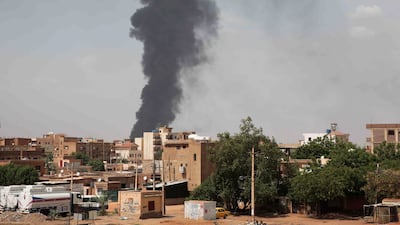Intensified fighting between Sudan's army and a rival paramilitary, particularly continuing battles over a key military base in Khartoum, has left Sudanese in despair at chances for peace, amid mounting devastation and misery.
The army says it has repelled repeated attacks by the paramilitary Rapid Support Forces on the strategic Al Shagara base, home of the Armoured Corps headquarters. However, the RSF maintains that its fighters are in control of the sprawling, White Nile-side base save a few “small pockets” of resistance.
It claimed to have seized 101 tanks and more than 100 armoured vehicles when its men entered the base. Hundreds of soldiers, including 18 senior officers, were killed and scores have been captured, it added.
The RSF claims could not be independently verified, but the paramilitary on Tuesday posted online videos showing its fighters walking among tanks and armoured personnel carriers inside what appeared to be a hangar. They were also shown to be firing in the air in jubilation. “We are inside Al Shagarah,” they shouted.

The loss of the Armoured Corps headquarters at Al Shagarah district would be a significant blow to the army and make a prized addition to a list of several key installations in Khartoum already under RSF control. These include the airport, the Nile-side Republican Palace, a large section of the armed forces headquarters, the base of a special police force and a large military industry complex.
It would also encapsulate the predicament of the army in its fight against a more agile and lightly armed force, whose men have emebededd themselves deep in Khartoum's residential areas since the war's early days.
The army has been using heavy artillery and air strikes, but has had little success in dislodging the RSF fighters, who have taken over thousands of homes across the city, and has caused heavy civilian casualties.
The fighting over Al Shagarah base, which resumed on Wednesday, although on a small scale, caused considerable damage to properties in the surrounding residential districts and left scores of civilians dead, according to residents.
The area's dusty streets have been strewn with rotting dead bodies. There has been no power or running water in the area for days, said residents. RSF fighters have also looted homes in the area, using some of them as field bases, they added. Many residents had already fled the southern Khartoum area.
“We are hating our lives this week and we just don't know where all these men with guns are leading us,” complained Imad Al Gazouly, a Khartoum resident who had fled the fighting and now lives across the Nile in the Al Jeref district.
“We have fled our homes and now we live in the city fringes without electricity or water. Those men (the army and the RSF) don't care about our lives or even humanity. May Allah's curse be upon them.”
Mr Al Gazouly is not the only civilian who has borne the brunt of the war, which broke out in mid-April and is essentially a fight for political and military supremacy between army chief General Abdel Fattah Al Burhan and his one-time deputy and ally, RSF commander General Mohamed Dagalo.
Nearly 4.5 million people have fled their homes since the fighting began on April 15, finding safety elsewhere in Sudan or crossing into neighbouring nations. Millions like Mr Al Gazouly remain trapped in Khartoum, dealing with lengthy power and water outages, scarce health care and skyrocketing food prices.
“The fighting is continuing today at Al Shagarah for the fourth day in a row. The Rapid Support Forces keep going in and out,” said Kamal Taha, a Khartoum resident. “When they retreat, they go into the homes they have taken over. The situation is unclear, to say the least.”
Fighting was taking place on Wednesday elsewhere in the Sudanese capital, which is made up of three cities – Khartoum, Omdurman and Bahri – built around the confluence of the Blue and White Niles.
“Army troops are launching combing operations in Odmuran this morning to flush out the Janjaweed from private homes,” said Insaf Abdullah, an Omdurman resident. She was using the name of the RSF's forerunner, a notorious Darfur militia that helped the government put down a revolt by ethnic Africans in the 2000s.
“The fighting is intense today and we are hearing very loud explosions. There's heavy smoke over Khartoum. The situation is very dangerous now. It's not like before. There's just no way for me to leave.”
The fighting in Sudan has been mainly centred in the Sudanese capital. A spillover into the restive Darfur region saw genocidal attacks in June and July by the RSF and allied Arab militias targeting ethnic African communities. The attacks left thousands dead, reviving memories of the civil war that raged in the area in the 2000s and left 300,000 people dead and displaced 2.5 million.


